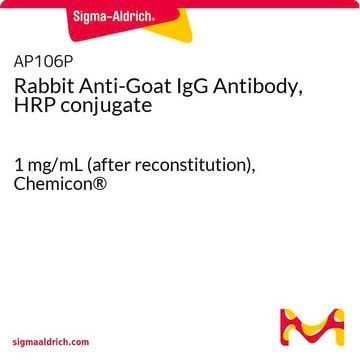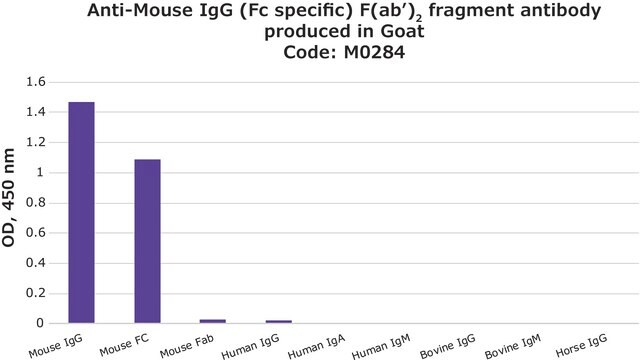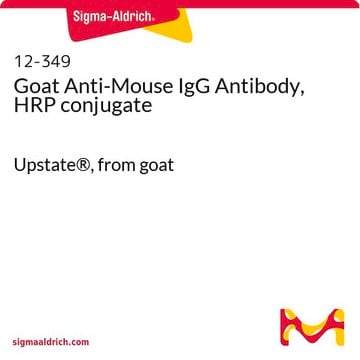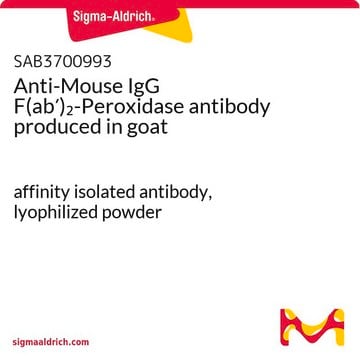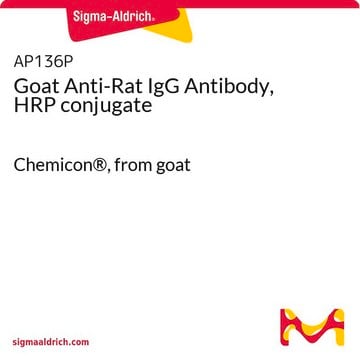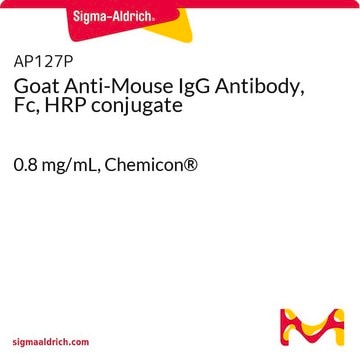AQ160P
Rabbit Anti-Mouse IgG Antibody, F(ab′)2, HRP conjugate
Chemicon®, from rabbit
Sign Into View Organizational & Contract Pricing
All Photos(1)
About This Item
UNSPSC Code:
12352203
eCl@ss:
32160702
NACRES:
NA.46
Recommended Products
biological source
rabbit
Quality Level
conjugate
peroxidase conjugate
antibody form
F(ab′)2 fragment of affinity isolated antibody
antibody product type
secondary antibodies
clone
polyclonal
species reactivity
mouse
manufacturer/tradename
Chemicon®
technique(s)
ELISA: suitable
western blot: suitable
shipped in
wet ice
target post-translational modification
unmodified
Application
Detect Mouse IgG using this Rabbit anti-Mouse IgG Antibody, F(ab′)2, HRP conjugate validated for use in ELISA & WB.
Research Category
Secondary & Control Antibodies
Secondary & Control Antibodies
Research Sub Category
Fragment Specific Secondary Antibodies
Fragment Specific Secondary Antibodies
Legal Information
CHEMICON is a registered trademark of Merck KGaA, Darmstadt, Germany
Disclaimer
Unless otherwise stated in our catalog or other company documentation accompanying the product(s), our products are intended for research use only and are not to be used for any other purpose, which includes but is not limited to, unauthorized commercial uses, in vitro diagnostic uses, ex vivo or in vivo therapeutic uses or any type of consumption or application to humans or animals.
Not finding the right product?
Try our Product Selector Tool.
Storage Class Code
11 - Combustible Solids
WGK
WGK 3
Certificates of Analysis (COA)
Search for Certificates of Analysis (COA) by entering the products Lot/Batch Number. Lot and Batch Numbers can be found on a product’s label following the words ‘Lot’ or ‘Batch’.
Already Own This Product?
Find documentation for the products that you have recently purchased in the Document Library.
Customers Also Viewed
Noah J Marcus et al.
Respiratory physiology & neurobiology, 183(2), 67-74 (2012-06-26)
Chronic intermittent hypoxia (CIH) raises arterial pressure, impairs vasodilator responsiveness, and increases circulating angiotensin II (Ang II); however, the role of Ang II in CIH-induced vascular dysfunction is unknown. Rats were exposed to CIH or room air (NORM), and a
Na Han et al.
Cell biochemistry and function, 39(4), 488-495 (2021-01-13)
Hyaluronic acid (HA) exerts a critical role in the lubricating and buffering properties of synovial fluid in joints. The production of HA is regulated by growth factors, hormones, inflammatory cytokines and mechanical load. The reduction of HA contributes to the
Luhui Cai et al.
Molecular medicine reports, 21(2), 959-968 (2020-01-25)
Dental pulp inflammation is a pathological process characterized by local lesions in dental pulp and the accumulation of inflammatory mediators. DNA methylation of cytosine residues is a key epigenetic modification that is essential for gene transcription, and plays pivotal roles
Amanda C Ampey et al.
Molecular and cellular endocrinology, 534, 111368-111368 (2021-06-22)
Uterine artery endothelium undergoes a form of functional adaptation during pregnancy because of an increase in Cx43 communication, resulting in increased Ca2+/IP3 exchange and more synchronous and sustained vasodilator production. We have shown previously that acute exposure to growth factors
Patricia M Garay et al.
Cell reports, 32(6), 108002-108002 (2020-08-14)
Long-lasting forms of synaptic plasticity such as synaptic scaling are critically dependent on transcription. Activity-dependent transcriptional dynamics in neurons, however, remain incompletely characterized because most previous efforts relied on measurement of steady-state mRNAs. Here, we use nascent RNA sequencing to
Our team of scientists has experience in all areas of research including Life Science, Material Science, Chemical Synthesis, Chromatography, Analytical and many others.
Contact Technical Service